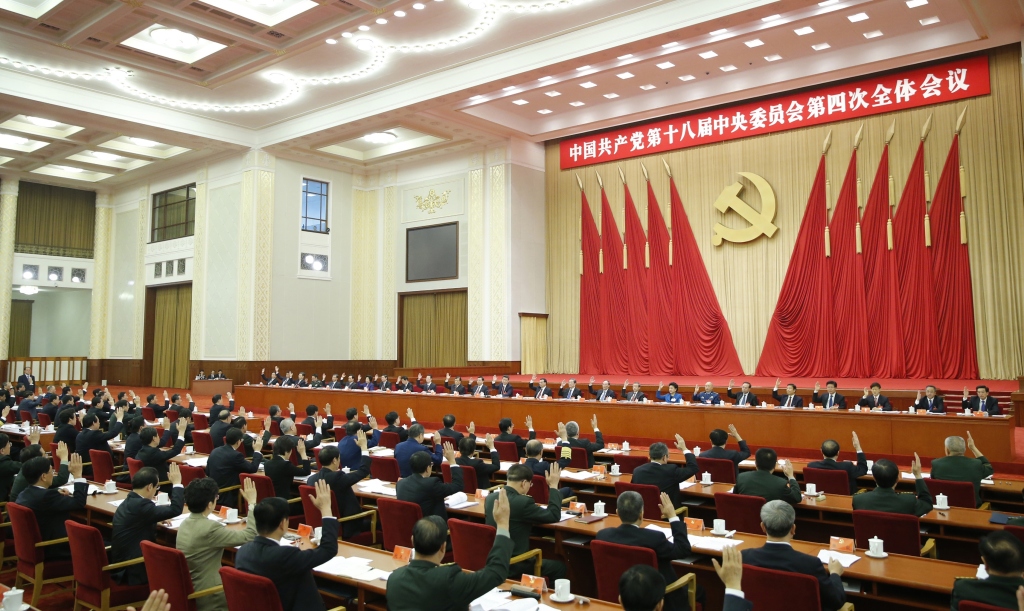 A peep around the corner
A peep around the corner
The Fourth Plenary Session of the 18th Central Committee of the Communist Party of China (CPC) was held in Beijing from 20th–23rd October, 2014. As one of the most influential political events in China, the theme of this year’s meeting—the rule of law—has drawn broad attention. Although it was incorporated into the People’s Republic of China (PRC) Constitution in the 1990s, this was the first time the doctrine was taken as the theme of a Party central meeting.
The outcomes of the meeting, and the CPC’s decisions, have been published in the document Decision on Major Issues concerning Comprehensively Advancing Rule of Law (4th Plenum Decision). Below, Tang Yunyun from Taylor Wessing, introduces and analyses key information from the document, to help you prepare for what’s around the corner.
Moving toward good Laws
The 4th Plenum Decision makes it clear that good laws are a precondition for rule of law. Measures to move towards good laws include constitutional examination, public participation in law-making, entrustment of legislation and enhancement of statutory interpretation.
Constitutional examination requires all ‘normative documents’ to be filed and checked in terms of their compatibility with the PRC Constitution. ‘Normative documents’ include laws, regulations and government orders which are not legislation but are still universally binding. Any provision failing the examination will be rescinded or rectified. Given foreign experience, such a system can be very punchy, especially when safeguarding private rights against public power.
Public participation in legislation already exists to some extent, but will be taken further. Entrustment of legislation, which will involve third parties in law drafting, however, is quite new. Hopefully, these steps will bring more democracy and rationality to legislation.
Statutory interpretation plays an indispensable role in the application of law. Legislation contains uncertainties for a variety of reasons, including vagueness of legislative language and the emergence of unforeseen circumstances or situations. Statutory interpretation helps clarify the original meaning of prescriptions and fill in the gaps between legal text and real life. The enhancement of statutory interpretation will no doubt contribute to mitigation of inconvenience in law application.
The focal points of legislation are also made clear, with a focus on a market economy, anti-corruption and environmental protection. The latter two were no surprise, and the details should be in place before too long. Under the heading ‘market economy’, the CPC sets out its aims for property rights to be secured by a fairness-centred legal system, and makes clear that land, energy, resources and finance are the priority areas for sound regulation, while admitting that monopolising remains a thorn in the side.
Government under law
“The vitality of law lies in its implementation and the authority of law is established during the implementation,” said President Xi Jinping, CPC Central Committee General Secretary: the 4th Plenum Decision echoes this opinion in pursuit of a government under law.
It starts by restricting governmental power. A list detailing powers afforded to the government will be published, and any not listed are unauthorised. Government will not be able to make decisions without merit that will undermine the legitimate rights and interests of, or impose any additional obligation on, citizens, corporations or other organisations.
Additionally, major administrative decisions within government will be stringently regulated. Statutory procedures are required to be followed, including public participation, expert discussion, risk evaluation, legitimacy review and group discussion. An accountability system will hold government officials responsible for their decisions on major issues for a lifetime. Lawyers and experts are expected to be engaged as the government’s legal counsels for better compliance.
Also, the system of administrative enforcement will be optimised. The enforcing team is to be integrated and enforcement rights will be modestly granted, and only to certified personnel. The discretion of enforcing personnel will be subject to set standards. Enforcement regarding food and drug safety, product quality inspections, public health, workplace safety, environment and resources and transportation will all be strengthened, the document states.
Transparency of administrative affairs is asked to be further promoted, especially in the field of budget, allocation of public resources, approval and performance of major construction projects and social public welfare undertakings.
Echoing the judicial reform that’s already underway, the 4th Plenum Decision brings forward quite a few new measures to tackle problems which are impeding judicial justice.
The independence of judges and prosecutors will be enhanced. Party and government organs, and their officials, will be prevented from poking their noses into judicial procedures. Offenders will get a bad record and a public criticism notice, and will be held accountable. Judicial functionaries will be placed under the shelter of a duty protection mechanism, while judges and prosecutors will not be transferred, discharged or degraded unless with a statutory cause and through a statutory procedure.
Meanwhile, judicial functionaries are also under regulation and supervision. They are required to obey statutory procedures and law application standards and are responsible for the quality of their cases. Transparent justice will expose their work to public scrutiny, and any corruption in the justice system will be vigorously punished.
In order to ‘professionalise’ its judicial system, China will recruit judicial officials from the legal sector.
As for new action regarding the structure of judiciary institutions, circuit courts of China’s Supreme People’s Court will be established; while courts and procuratorates with jurisdictions over cross-region cases are being contemplated. This move aims to eliminate local interference and local protectionism.
Enforcement of judgement is not overlooked, and specific laws will be issued to tackle what is currently a chronic problem.
Comments
The fourth plenary session was billed as a milestone in China’s political reforms as it gave prominence to the topic of ‘rule of law’, which is essential as the Chinese economy becomes increasingly sophisticated. With people expecting more fairness and justice and looking forward to the country’s prosperity and long-term stability, the 4th Plenum Decision functions as a pacifying blueprint.
According to the 4th Plenum Decision, the country’s situation has been thoroughly evaluated and assessed. The Party’s commitment to a powerful legal basis, a compliant government with constrained power and impartial justice is greatly inspiring, reflecting China’s updated ruling philosophy, which is steering the country towards being ‘rule-orientated’.
In legislation, constitutional examination and democratic legislation are quite impressive. Their value in the protection of human rights and the control of public power has been proven, and their implementation is the foundation of ‘rule of law’, as opposed to ‘rule of men’.
It is anticipated that China will continue the process of building a law-abiding and capable government. The government is to be put on a legal trajectory: new measures should be effective in squeezing out room for power rent-seeking and restraining the abuse of power. Government power lists and the life-long accountability system are considered ground-breaking and give an indication of the Party’s determination.
Judicial justice is a refreshing topic that’s been anticipated for a long time. China is aware of the key elements required to reach its goal: independence, integrity and professionalism. Only a clean and capable judicial system standing on its own can bring China real justice.
Nevertheless, despite this thorough plan, now is not the time to jump to the conclusion that China has evolved into a nation under the rule of law. Implementation is what matters most, and only time will tell.
Taylor Wessing is a full-service international law firm, working with clients in the world’s most dynamic industries. Its 26 offices around the world blend the best of local commercial, industry and cultural knowledge with international experience.



Recent Comments